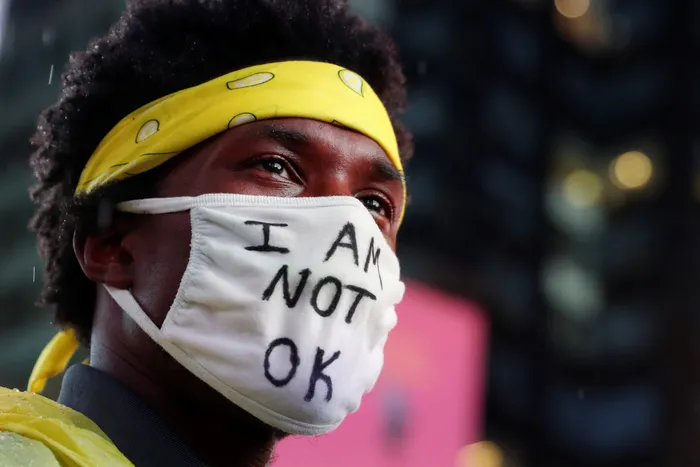The anti-Blackness of 'the Black kids teased me for talking White'

Picture: REUTERS/Shannon Stapleton
By Damon Young
Race is a social construct with an arbitrary and elastic hierarchy. The only static element is that people deemed "Black" exist at the bottom. American University's Antiracist Praxis subject guide defines anti-Blackness as "specific forms of racism contingent upon or cast through the denigration, disenfranchisement, and disavowal of people racialized as Black." And anti-Blackness is atmospheric - felt everywhere, but usually only seen if you know what you're looking for.
It's not just a word. Not just another unnecessarily complex form of academese. It's tangible. Material. Tactile. It's the belief, for instance, from actual medical professionals today, that Black people have higher tolerances for pain than White people do. Imagine how that fallacy dictates treatment and medication and aftercare and insurance premiums. And then imagine all the societal ripples - the maternal mortality rates, the life expectancy disparities, the mis-and-missed diagnoses, the distrust in medicine - stemming from that one disbelief. Denying that anti-Blackness exists is like denying the existence of the chair you're sitting in or the blood on the blade that just slit your throat.
It's also sneaky. Subtle. Slippery. And not exclusive to overt bigots. Everyone gets a chance. Everyone gets a turn. Anti-Blackness does not discriminate. (I think that's irony.) Black people can be anti-Black too.
I have to remind myself of this when I'm witnessing another (the thousandth? millionth?) conversation where full-grown Black people lament that they were teased, as children, by other Black kids for "talking and/or acting White." It's a subject that reinforces the lie - which some bad-faith White people are desperate to believe - that learning in school is considered, by Black children, to be a bad thing. A White thing.
You can assume the children being teased were thought to be nerdy or were just unpopular. The problem here - well, one of the problems (I'll get to another problem soon) - is when teasing a child for being socially awkward is considered unique to Blackness. Which then reinforces the lie of Black pathology - that something is inherently deficient in us. The truth is that kids who are considered unblinking and uncool academic strivers are teased by everyone. I've both attended school and worked in predominantly Black and predominantly White districts. (I've been around.) That sort of teasing transcends race, culture and class. It is not a good thing that a certain type of kid is teased everywhere. I hate that for them. But it's definitely, absolutely, positively not a Black thing either. And yes, "White" might have been the word used during said teasing, instead of "nerd." But White in this context is a synonym for awkward or uncool. Not smart.
Another tentacle of anti-Blackness is the presumption that young Black kids don't possess the mental acuity to be savvy enough to recognize when peers are overtly anti-Black. This, again, is a fallacy popular with (some) non-Black people and (some) Black people. I'm curious how many of these full-grown Black adults, who claim that they were ridiculed by Black kids for acting or talking "White," were intentional about distancing themselves from other Black people as far as they could get. I don't mean that they were into anime while their classmates were into Ashanti. (It is possible to be into both, you know?) But that they considered Black people and Black cultures to be below them - an albatross they needed to unfasten themselves from and rise above - and they mimicked their speech and behavior after how they believed White people acted. Basically, they weren't teased for talking White because they were good in school. They were teased because they were . . . acting and talking White. (There's a clear distinction, by the way, between speaking "proper" and speaking "White." But unschooled and bad-faith observers - Black and non-Black - of this dynamic conflate the two.)
I don't blame a young Black person for behaving this way. When you're inundated, ceaselessly, seductively, violently, that Black is bad and Black people are cursed - falsely told that we are destined, through our inherent deficits, to be a permanent underclass - of course you'll be tempted to rid yourself of it. Of course. Of course. And while some of us are more susceptible than others, we're all vulnerable. My first real job after college, for instance, was teaching high school English in Pennsylvania's Blackest school district. I anticipated that the experience would be like the first 15 minutes of "Lean on Me," and I braced myself for conflict. Violence, even. But I quickly discovered that to be an effective teacher of these kids - who were just as pimply and awkward and silly and snotty-nosed and sweet as any other high school kid was; as I was - I had to confront my own anti-Blackness, and I had to change.
My frustration is with the full-grown Black adults who still spread the gospel of anti-Blackness, with their myopic and uncritical assessments of why they were teased. The sentiment isn't much different from what we hear from well-paid and widely platformed merchants of Black pathology, from Candace Owens and Clarence Thomas to Bill Cosby and Kanye West, parroting the worst things the worst White people think of us. Maybe they still think that the farther they are from us, the closer they are to them. I just wish they'd come home.
Young is a contributing columnist to The Washington Post Magazine. He is also the author of “What Doesn’t Kill You Makes You Blacker: A Memoir in Essays.” He is a writer in Pittsburgh.
This article was first published in the Washington Post
Related Topics: